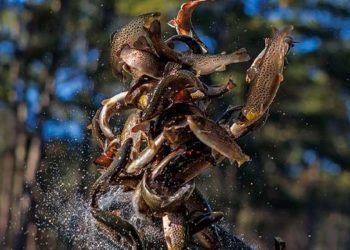
The pollock trawling fleet operating in the Gulf of Alaska has actually been closed down early due to a worrying variety of chinook salmon appearing as bycatch. According to SalmonState, a not-for-profit preservation group, 2 “midwater” pollock trawl boats mistakenly netted 2,000 chinook salmon in one day, which brought the “approximated season overall of chinook bycatch to near or over their permitted number.”
Basically, trawlers are permitted to capture a specific variety of chinook salmon each year as they trawl for pollock. Any fish that isn’t pollock is thought about “bycatch” and needs to be tossed back (although fish generated as bycatch are frequently dead). This bycatch number has actually been at the center of strong dispute, particularly as chinook salmon numbers continue to plunge, effecting a myriad of other marine and freshwater types.
The trawling neighborhood has actually come under fire just recently from industrial crab anglers to leisure anglers alike. Trawlers are frequently implicated of having an unfavorable influence on fishery and environment health through their techniques of capturing fish, which is suspending internet and dragging them along behind the boat.
According to SalmonState, “While pelagic or midwater equipment is expected to be off the seafloor, current research studies discovered that trawl internet call the bottom usually 40% to 80% of the time, with rates as much as 100% on factory ships, likewise called catcher/processors.” The trawlers who captured the chinook and required the closure of the pollock season were utilizing midwater trawling equipment.
SalmonState likewise released 2024’s present bycatch numbers in both the Gulf of Alaska and the Bering Sea, which stands at:
- 34,017 Chinook salmon
- 44,843 Pal salmon
- 818,476 crabs
- 3.8 million pounds of halibut
- 3 million pounds of herring
” Federal trawl fisheries capturing Chinook in Alaska’s waters have actually had a harmful influence on our neighborhoods and the households that trust a healthy environment to practice a way of living that stays main to who we are as Native Peoples. The injustices in policy that enable bycatch of Chinook in Alaska waters while People have actually restricted or no gain access to is undesirable,” stated Craig Chythlook, Fisheries Policy Director for Native Peoples Action.





